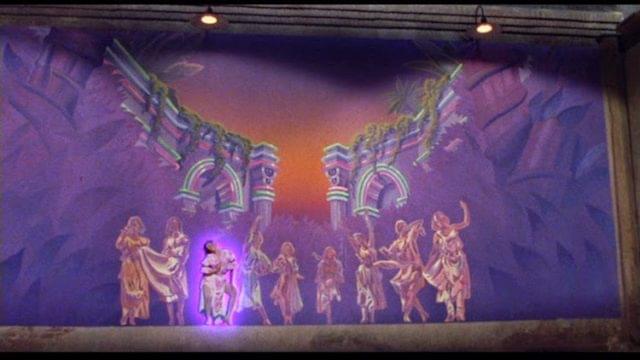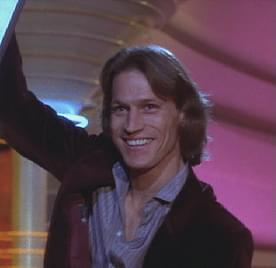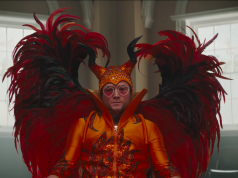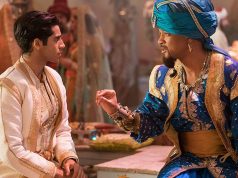
The 1980 musical/romance/fantasy/trainwreck “Xanadu” is now famous primarily for being one of the few films to start with “X,” which is very handy if you’re playing Scattergories. But when the film was made, it was notable for being Olivia Newton-John’s follow-up to “Grease,” and it was intended to help her break out as a big-time actress.
This was a foolhardy plan, of course, given that Olivia Newton-John, for all her charms, cannot, as it turns out, act. She’d managed to get famous when “Grease” was a hit, but she should have quit while she was ahead. Plunging forward with another starring vehicle was like pulling off a bank robbery by sheer luck and then, as an encore, trying to burglarize the Batcave.
In “Xanadu,” Newton-John plays one of the nine Muses of Greek mythology — Terpsichore, Muse of dance, specifically, though her friends call her Kira. She and her eight sisters live in a mural in a Los Angeles barrio (duh!), and she’s awakened when a struggling artist named Sonny (Michael Beck) gets frustrated, tears up a sketch he’s been working on, and throws the pieces out the window. Why an artist’s torn-up sketch would conjure the Muse of dance, I cannot say. But you will recall that this is more or less the same way Mary Poppins was summoned by Jane and Michael Banks. I don’t want to encourage littering, but it would seem to be an excellent method of contacting supernatural women.

Sonny, the artist, is a skinny, feather-haired, horse-faced young fellow, a slightly more feminine version of Ann Coulter. The movie insists he is a real ladies’ man, which is one of the sure signs you’re dealing with a bad movie, i.e., when it tries to convince you of something that is obviously untrue. Sonny used to work for a record label, but he quit to go freelance; now, his options having dried up, he is going back to work for The Man. “Oh, what the hell,” he says, in the first dialogue of the movie. “Guys like me shouldn’t dream anyway.” He’s right, of course — the dreams of skinny, feather-haired, horse-faced young fellows rarely come true, Sarah Jessica Parker notwithstanding.
So Sonny returns to AirFlo Records, immediately starts arguing with his boss (who has the nerve to expect productivity from him), works for approximately 12 seconds, then leaves to go look for the woman who appears as a model on an album cover and who also roller-skated past him in the park this morning and kissed him. She is Kira, of course, and Sonny finds her hanging around an abandoned theater, where she roller-skates a lot. She wears roller skates most places she goes. Sonny does too, sometimes. The movie thinks there is nothing more interesting than watching people roller-skate, especially if it is accompanied by songs by Electric Light Orchestra. Of the film’s 95 minutes, I would estimate that roller-skating is the primary focus of 93 of them. Even Gene Kelly roller-skates at one point!
Oh, did I forget to mention that legendary Hollywood icon Gene Kelly appears in this film, and that it was the last movie he ever made? I’m sorry if that depresses you. Imagine how it must have made Gene Kelly feel. He plays Danny McGuire, a former big-band clarinetist who now occupies his time sitting on the beach and playing the clarinet for no one in particular, which, let’s be honest, is probably really annoying to his fellow beach-goers, I don’t care if he is Gene Kelly. He meets Sonny, and somehow the two of them decide to open a nightclub together, either in the old 1940s style that Danny remembers, or in the modern rock ‘n’ roll style that Sonny likes. We see fantasy musical numbers involving both concepts, and the movie doesn’t tell us which one they’ve decided on. When the club finally opens, at the end of the film, it turns out to be more of a roller-disco, and it has mimes who juggle bowling pins — so I guess instead of going with Danny’s idea or Sonny’s idea, they went with Satan’s idea. A reasonable compromise, you’ll agree.
But I have roller-skated ahead of myself! Gene Kelly gets to dance in one major sequence, set to an old-timey big-band song, joined by Olivia Newton-John, whom you can ignore by taping a piece of paper over the right half of your TV screen. Kelly is genuinely charming. It is the one legitimately enjoyable part of the film, like a single rose blooming in the middle of an oil-rig fire.
By opening the new nightclub, called Xanadu, Sonny is at last realizing his dream. Earlier we thought his dream was to be a successful artist, but apparently it was actually to open a nightclub. The movie was just kidding about the artist thing. That “Xanadu,” such a prankster! His dream now fulfilled (at least until he changes it to something else), Sonny angrily quits his job at the record label again, where he’s toiled for about five minutes combined ever since he came back. “I’ve worked like a dog!” he shouts at his boss, using the expression in its literal sense to mean that he has worked like an animal that never does any work.
But Sonny’s happiness is not complete yet. There’s still the matter of his being in love with a mythological figure, which is problematic insofar as Kira is immortal and ageless and Sonny will have to be put down the first time he breaks a leg. Kira confesses her true identity to him and heads back to the electric-hued limbo-land where she and her sisters live, pursued by Sonny, who enters the magical realm by running at top speed into the brick wall on which the mural is painted. Why this works for him when it never does for Wile E. Coyote is not clear.
Once inside the Acropolis, or Valhalla, or Purgatory, or wherever it is that the Greek gods chill, Sonny makes an impassioned plea for Kira to return to Earth and be his girlfriend, even though it is against the rules for immortals to mingle with mortals. Kira responds by singing a song, I think. I sort of lost interest here. Zeus and Mrs. Zeus, represented by disembodied voices in order to avoid protests and death threats from the hardcore Greek polytheists who consider visual depictions of the gods blasphemous, decide to send Kira back to Earth, and they all live roller-skatingly ever after.
Note: If you’re wondering whether the director of “Xanadu,” Robert Greenwald, also directed the Farrah Fawcett made-for-TV movie “The Burning Bed” or the salacious ’70s TV films “Katie: Portrait of a Centerfold” and “Sharon: Portrait of a Mistress” or the hilariously titled 1979 flick “Flatbed Annie & Sweetiepie: Lady Truckers,” the answer is yes.
— Film.com





